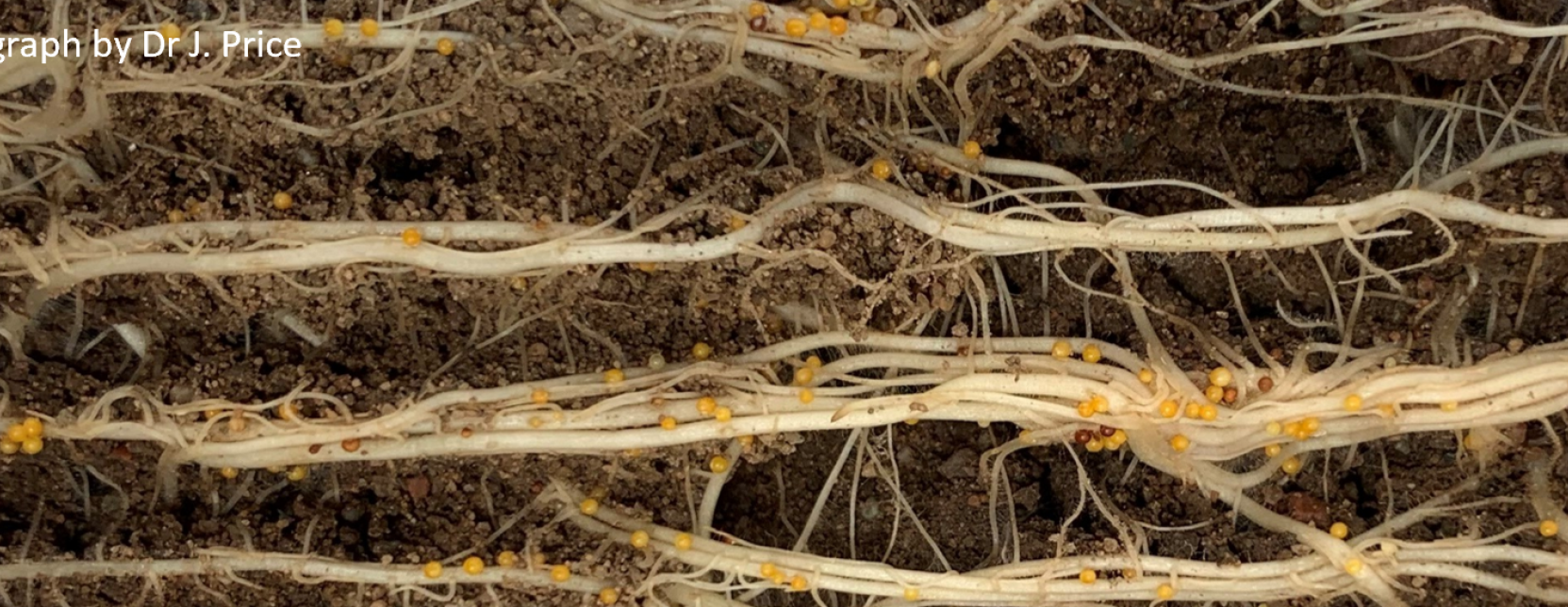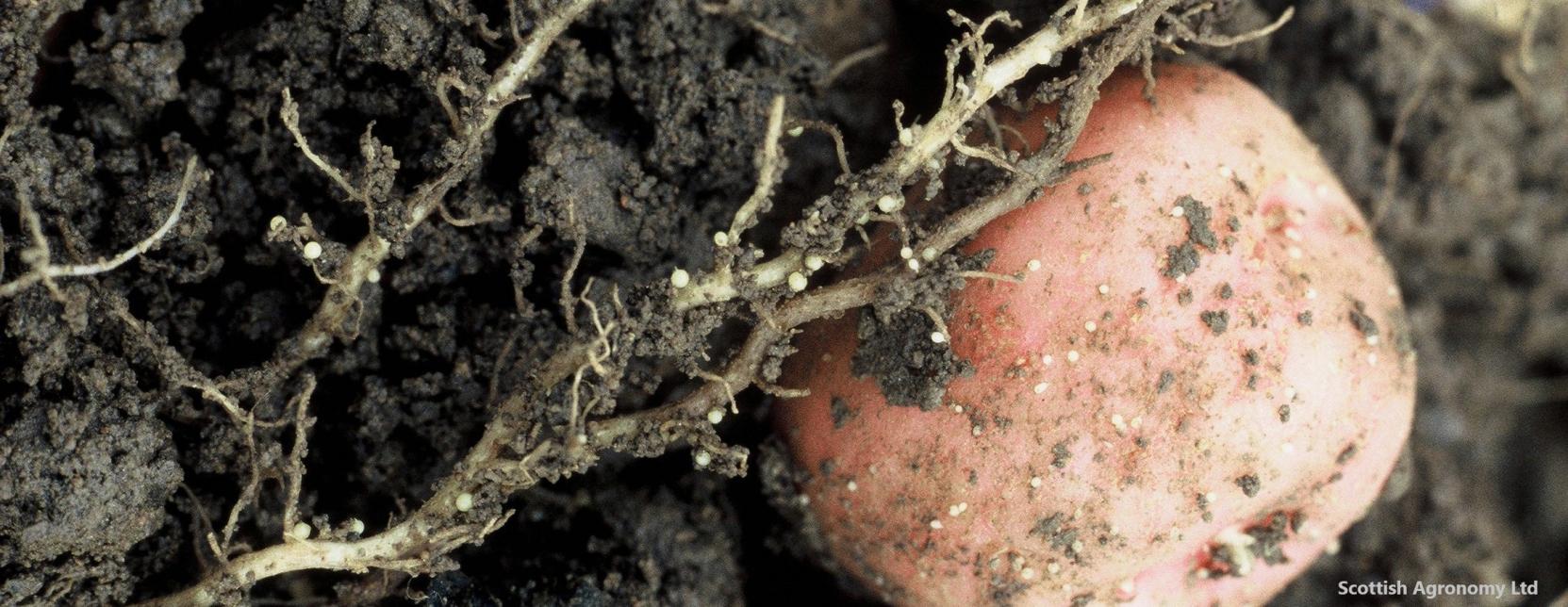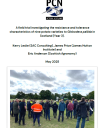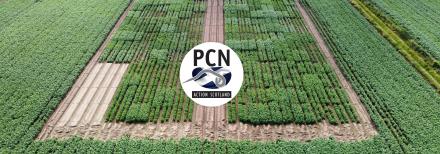-
 Potato Cyst Nematode Hub
Potato Cyst Nematode HubThe UK is the 5th largest potato producer and exporter in Europe with an industry worth ~£4.5 billion. Almost 80% of seed potatoes used in Great Britain originate from Scotland. The industry is under threat from potato cyst nematodes (PCN) which have spread across potato growing areas for decades. PCN drastically reduce yields and are incredibly difficult to control. Scottish legislation prevents seed potatoes being grown on land where PCN have been detected to reduce further introductions. However, PCN are already present in almost 21,000 ha of Scottish soils. Recent predictions suggest PCN will cause the end of the Scottish seed potato industry by 2050, potentially only 5 rotations away. If this happens, the UK potato industry will consequently collapse.
 Potato Cyst Nematode Hub
Potato Cyst Nematode HubDelivering a sustainable potato industry for Scotland through management of Potato cyst nematode (PCN).
-
Potato Cyst Nematode Hub
The UK is the 5th largest potato producer and exporter in Europe with an industry worth ~£4.5 billion. Almost 80% of seed potatoes used in Great Britain originate from Scotland. The industry is under threat from potato cyst nematodes (PCN) which have spread across potato growing areas for decades. PCN drastically reduce yields and are incredibly difficult to control. Scottish legislation prevents seed potatoes being grown on land where PCN have been detected to reduce further introductions. However, PCN are already present in almost 21,000 ha of Scottish soils. Recent predictions suggest PCN will cause the end of the Scottish seed potato industry by 2050, potentially only 5 rotations away. If this happens, the UK potato industry will consequently collapse.
-
Potato Cyst Nematode HubRead more
Delivering a sustainable potato industry for Scotland through management of Potato cyst nematode (PCN).
Latest Project Outputs
PCN Barnyard Trial Report 2025.pdf
In 2024 a field trial was established which aimed to provide information on the integrated control of Globodera pallida. This report publishes the…
Latest NewsView All News
Latest PublicationView All Publications

The PCN Action Scotland field trial 2024 report - A field trial investigating the resistance and tolerance characteristics of nine potato varieties to Globodera pallida in Scotland (Year 3)
In 2024 a field trial was established which aimed to provide information on the integrated control of Globodera pallida. This report publishes the results of the field trial planted at Barnyards Farm on 23/05/2024 - a location with a moderate-high PCN population. The trial consisted of 9 potato varieties (Maris Piper, Elland, Eurostar, Buster, Amanda, Karelia, Bruar, Olivia, and Paradox) with varying levels of resistance to both G. Pallida and G. Rostochiensis. Replicates of each variety were treated with either Nemathorin 10G (30 kg/ha, a.i. Fosthiazate), Velum Prime (0.625 L/ha in furrow a.i. fluopyram), or left untreated.
Sign up for our newsletter
Sign up for our Newsletter and to be kept informed about Centre activities:
Our Next Event
Date: 18th March 2026
Time: 10:00 AM - 3:00 PM - Lunch Provided
Location: The James Hutton Institute - The crop Innovation Centre Auditorium
Tickets: https://tinyurl.com/mtfjwxbw
Join us for our final session as we conclude the PCN Action Scotland project. This event will spotlight our key findings, with posters and presentations from each work package:
- Economics
- Decision Support
- Resistance Marker Development
- Dihaploid Breeding
- Tolerance
- Ground Keeper Control
- IPM Tools
- Knowledge Exchange
- Policy
The program will also include analysis of the multi-year field trials data and present our recommendations for changes to current PCN policy aimed at strengthening Scotland's ability to manage PCN in the future.
Our Next Event
Date: 18th March 2026
Time: 10:00 AM - 3:00 PM - Lunch Provided
Location: The James Hutton Institute - The crop Innovation Centre Auditorium
Tickets: https://tinyurl.com/mtfjwxbw
Join us for our final session as we conclude the PCN Action Scotland project. This event will spotlight our key findings, with posters and presentations from each work package:
- Economics
- Decision Support
- Resistance Marker Development
- Dihaploid Breeding
- Tolerance
- Ground Keeper Control
- IPM Tools
- Knowledge Exchange
- Policy
The program will also include analysis of the multi-year field trials data and present our recommendations for changes to current PCN policy aimed at strengthening Scotland's ability to manage PCN in the future.



